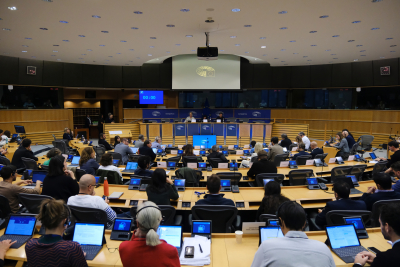Three things big business could learn from public CBCR
For a long time we’ve been calling for mandatory disclosure rules on what multinationals pay in the form of taxes or other payments to the governments in each of the countries they operate in.
This year the European Commission published a legislative proposal to improve corporate tax transparency in the EU. Despite being far from perfect, this is a unique opportunity for European citizens and potentially those of developing countries to hold big multinationals to account and to ‘follow the money’.
Over the last few months this text has been under discussion by EU Member States. Many of them are still resisting the idea of this information being in the public domain.
Looking at the position papers of big business it’s easy to see how the powerful lobbying effects of organisations such as Business Europe might be influencing Member States’ positions on this crucial proposal.
So we thought we’d take a look at the arguments against transparency being made by Business Europe in this paper published last July and address some of their main concerns. Despite supposedly supporting the fight against tax fraud, they have explicitly called for the total withdrawal of the Commission’s proposal on corporate tax transparency or public “country-by-country reporting” (CBCR).
- Tax authorities and civil society have very distinctive roles when it comes to corporate accountability.
Public CBCR legislation will allegedly undermine the role of tax authorities, who have both the expertise and legitimacy to scrutinise all collected data.
We absolutely agree with Business Europe that the role of tax authorities is to properly enforce tax rules and that the public should not play the tax inspector.
However, “confidential” CBCR and public CBCR have two very different purposes: the former is a tool aimed at tax administrations, so that they can better assess risks of tax avoidance and fine non-compliant companies; the latter is a tool for civil society and policy makers to scrutinize companies’ operations and hold them to account. The end goal is for decision makers to potentially change the rules if loopholes in the current system are identified. And this can only happen thanks to greater awareness and transparency.
On top of this, Business Europe claims that public CBCR could jeopardise information sharing between countries. Of course, national tax administrations are bound by strict confidentiality rules when sharing and receiving information from other jurisdictions. However, as Business Europe fails to point out, the Commission’s public CBCR proposal does not require any government to publish anything. They would continue sharing the information confidentially among tax administrations. The proposal only requires multinationals to directly publish their own information.
- Restoring trust to business and democracy cannot be perceived as a burden.
Business Europe believes that public CBCR would burden companies with heavy explanatory efforts in order to prevent reputational damage. However, corporate reputation is increasingly recognised as an important intangible asset of every firm. PricewaterhouseCoopers state that non-transparency to avoid financial or reputational damage is like “gambling in the tax-detection-risk lottery”. If Business Europe is concerned about citizens misinterpreting multinationals’ financial data, it will certainly be reassured by the fact that the Commission’s proposal requires companies to add an overall narrative to their CBC reports in order to help them provide explanations on any discrepancy between the amounts disclosed.
At Transparency International EU we firmly believe in the potential of public CBCR to transform public perception on the activities of “big business”. The acknowledgment of public scrutiny mechanisms will redefine the relationship between what a considerable segment of European society unsympathetically perceives as an increasing disconnect and disaffection with “corporate elites”.
The risk associated with creating extra administrative burden for companies can no longer be taken as a valid argument, given the already existing requirement for multinationals’ to report their tax-related financial information to tax administrations. Reports already have to be drafted, however they are only due to be shared with tax authorities. We are now just advocating for existing CBC reports to be made public, which will obviously not entangle further costs.
- Public CBCR does not affect competitiveness and, if anything, might improve economic growth.
Unfortunately there are several unfounded myths around public CBCR which recur time and again in corporate arguments against this kind of transparency. One of these often cited myths is that public CBCR would place companies at a competitive disadvantage vis-à-vis those who do not publically report. This statement, however, has yet to be properly backed up with facts, figures and concrete evidence. So we decided to explore this concern ourselves.
Our recent report aimed at analysing the impact of public reporting on corporate competitiveness has found that there is no definitive correlation between public CBCR and standard measures of competitiveness. On the contrary, 86% of the European companies already publicly reporting on a country-by-country basis, which we assessed for this report, improved or maintained their revenue growth during the assessment period. Some of the more household examples include BNP Paribas, Deutsche Telekom and Vodafone.
It’s important to acknowledge the effect of taxes on companies’ cash flows: public CBCR may attract more investment, since the risk profile of the company can be lowered with the release of more information compared to competitors not engaged in public CBCR. Public demands for greater transparency are a growing dynamic. The increasing number of companies voluntarily embracing these standards in their corporate PR strategies is a reality, overcoming some of the associated myths and taboos, and sending a clear message to competitors: either adapt, or lag behind.
Black Rock’s former Managing Director, Morris Pearl, recently highlighted the risks and threats entailed by “egregious tax practices” to multinational companies and shareholders: it is growing increasingly difficult to assess how healthy a company is, and if profits are “merely a reflection of aggressive tax planning”.
For him it is crystal clear: it is an issue of ensuring market integrity. For us it’s an issue of ensuring transparency and fairness. And we’re glad the European Commission has acknowledged these arguments, at least in part. Now it’s up to the EU Member States to see where they stand on these values.




